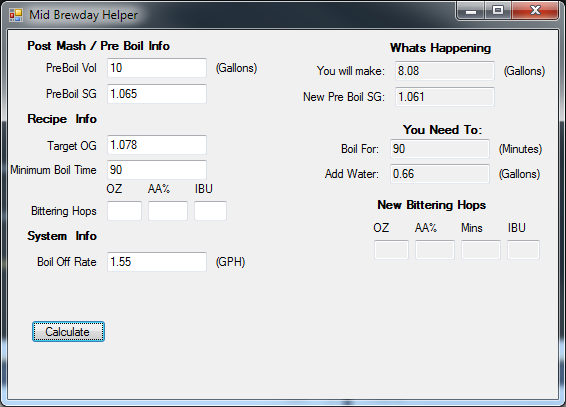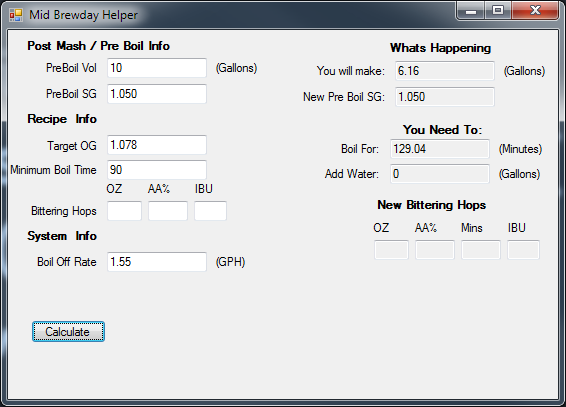I'm into my second AG brew and will start my 3rd in the next couple of weeks. First batch(black ipa) didn't collect much data but seem to hit most of the numbers(mash temps & OG) 2nd batch(kolsch) collected more data. Hit mash temps and volumes but not pre-boil or post-boil SG's. I understand that one possible issue is my mill/crush, I'm working on that. Finally my question. What can I do near the end of boil to hit target OG? Add DME, 1c.=8pts? or boil longer, will reduce post boil volume? Combination? Just asking for a little guidance. Thx.
You are using an out of date browser. It may not display this or other websites correctly.
You should upgrade or use an alternative browser.
You should upgrade or use an alternative browser.
Help a new AG brewer
- Thread starter anteup
- Start date

Help Support Homebrew Talk - Beer, Wine, Mead, & Cider Brewing Discussion Forum:
This site may earn a commission from merchant affiliate
links, including eBay, Amazon, and others.
Kingbogart
Well-Known Member
- Joined
- Nov 18, 2013
- Messages
- 212
- Reaction score
- 37
If you need to correct for being under on gravity the time to do it is generally pre-boil. Adding any dme or lme at the end is going to affect your flavor as your hops and such have already been added. This will throw off your bitterness, flavor and aroma.
Since sugars don't disappear during the boiling process, the preboil gravity * preboil volume = postboil gravity * postboil volume. If you don't have enough points before the boil, you won't have enough after for your wanted volume.
If you're short before boiling, add some dme or lme to get to your desired preboil gravity, and then proceed as normal.
If you're okay having less volume but hitting your recipe OG, you can boil longer, but you will also want to adjust the hopping schedule to account for the longer boil.
Since sugars don't disappear during the boiling process, the preboil gravity * preboil volume = postboil gravity * postboil volume. If you don't have enough points before the boil, you won't have enough after for your wanted volume.
If you're short before boiling, add some dme or lme to get to your desired preboil gravity, and then proceed as normal.
If you're okay having less volume but hitting your recipe OG, you can boil longer, but you will also want to adjust the hopping schedule to account for the longer boil.
Not sure if I agree with Kingbogart. Lots of extract and PM recipes call for adding extract at the end of the boil to prevent caramelizing and darkening the color of the wort. I would think if you miss your OG you should be fine adding extract near the end of the boil. Not sure of the amounts needed. I'm looking to make the jump to AG soon, so I'm just conjecturing. Hopefully now that you have two differing opinions, someone will jump in to break the tie.
BeerLoverHere
Well-Known Member
If you have pre-hopped wort extract do it at post boil; if you have dme or other extract that has not had contact time with hops, do it pre-boil.
I have never added anything to post-boil to try and get OG on target with a recipe. Just learn to maximize your efficiency of your grain by mashing for 60 minutes and doing a slow sparge trickle at 168 degrees for 30-40 minutes until gravity on collected wort reaches 1.010. You'll be right on or near your targeted gravity everytime if you use good software to keep track of your recipes. Worry about that, and you won't have to worry about being off/adding my wort at end of boil.
I have never added anything to post-boil to try and get OG on target with a recipe. Just learn to maximize your efficiency of your grain by mashing for 60 minutes and doing a slow sparge trickle at 168 degrees for 30-40 minutes until gravity on collected wort reaches 1.010. You'll be right on or near your targeted gravity everytime if you use good software to keep track of your recipes. Worry about that, and you won't have to worry about being off/adding my wort at end of boil.
dadshomebrew
Well-Known Member
- Joined
- Feb 24, 2014
- Messages
- 73
- Reaction score
- 11
It is a good idea to check your pre-boil gravity and volume everytime, just to make sure you are on target. The LHBS screwed up my grain order and I only found out after taking my pre-boil gravity. My cheapy $20 refractometer is a lifesaver.
If you do need to increase gravity, you want to do so pre-boil. Otherwise your hop utilization will be off.
Keep in mind gravity and volume (both pre and post boil) are linked. You need to be confident in your methods for measuring both so you can make the appropriate adjustments.
If you do need to increase gravity, you want to do so pre-boil. Otherwise your hop utilization will be off.
Keep in mind gravity and volume (both pre and post boil) are linked. You need to be confident in your methods for measuring both so you can make the appropriate adjustments.
Adjust your efficiency (of course this will not help for a batch your are currently working on). What software are you using? Are you milling your own grain?
To answer some questions. I'm using BeerSmith, batch sparge, used both a refractometer and hydrometer. 2nd batch was the first time I used refractometer so I checked against hydrometer. Did adjust for temps with hydrometer and I did calibrate refractometer(I think correctly). I'm a carpenter and I get clients that say I can do that. So when they screw up, which we all do, they ask me to fix it. That's the difference between amateur and professional, I know how to fix my mistakes.
Similar threads
- Replies
- 48
- Views
- 2K
- Replies
- 13
- Views
- 770
- Replies
- 16
- Views
- 1K



